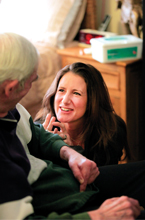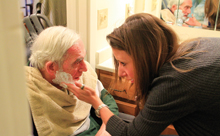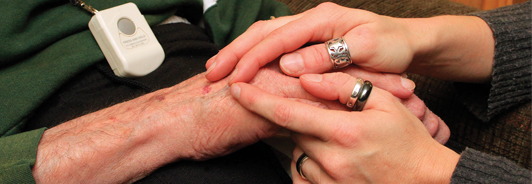The Conversations We All Need to Have
Fears of aging and dying influence necessary end-of-life planning
— Anne Cumming Rice, photography by Barry Guiterrez
When Robbyn Wacker’s grandfather was in his 90s and living in a senior apartment complex, she asked him if he wanted to go downstairs and play pool with some of the other residents.
“No, I don’t want to be around old people,” he said.
Ironic as his response sounds, it highlights a reality in our culture — we have a disdain for growing old.
“We do a lot of things to mask that we’re aging,” says Wacker, UNC Gerontology professor, author of Aging Social Policies: An International Perspective and the university’s acting provost and senior vice president for the Division of Academic Affairs.
“We think, ‘I’m not old. It’s a bad thing to be old,’ and we don’t think that this process of aging is a valuable part of life,” Wacker says. “But these are the same attitudes that force us into a crisis when we’re faced with our own mortality.”
 In her work with Family Hospice, Gemma
In her work with Family Hospice, Gemma
Wilson hears from older adults who think they’re
protecting their children or keeping them from
worrying by not being upfront about what they
want. But the opposite is more often true.
Fear of growing old and dying keeps many older adults from making necessary end-of-life plans — not just about how they want to die, but how they want to live their remaining years. More often than not, critical decisions get made during a crisis.
But it doesn’t have to be this way.
People need to ask themselves, ‘How do I want to set up my last remaining years on this planet?’ ” Wacker says. “It’s a life stage where you want to feel good about what you’ve done, but you need to prepare for what’s ahead. As you age, your social losses become more acute and your independence is dwindling.”
Adults ages 65 and older represent about 13 percent of the U.S. population, according to the U.S. Department of Health and Human Services’ Administration on Aging. But the number of older adults is increasing. By 2030, the same population is expected to be about 20 percent of the country’s population, creating a growing need for professionals to go into fields that serve older adults.
The master’s program in Gerontology at UNC trains students to become leaders and experts in the field of aging. One of them is Gemma Wilson, who graduated from the program last spring and works in community and education outreach for Boulder-based Family Hospice.
“So many people don’t want to think about getting older and dying until it’s too late,” Wilson says. “But when it’s too late, everyone is stressed out and scrambling. Making plans for the end of your life doesn’t have to be this big, scary thing.”
Difficult decisions
There are legal considerations. They include living wills, medical powers of attorney, estate planning and financial issues, such as long-term-care insurance. People in their 40s should be thinking about and determining these issues for themselves, long before many are even thinking about the end of their lives, Wacker says.
But as people grow older, other important decisions are often more emotional and difficult, for both older adults and their children. How do you draw the fine line between allowing an older adult as much independence as possible and being practical about what he or she is able to do? When is it time to have someone come into an older adult’s home to help with household tasks? When is it time to move into an assisted-living facility?
When death draws near, who does the older adult want to be there, and what kind of environment will make the person feel most comfortable?

It’s expected that adults ages 65 and older will increase from the current 13 percent of the U.S. population to 20 percent by 2030,
creating a growing need for professionals to go into fields that serve older adults.
And ultimately, who is responsible for starting the conversation about these issues — the older adult, or their children?
The answer to the latter, ideally, is both.
“There are some people who have this conversation with their kids way early on, but I don’t think that’s the norm,” Wacker says. “I’ve heard older adults say, ‘Well, I’ll let the kids sort it out.’ That may work in some families, but why risk it? Families may be devastated and hurt in the long run because there wasn’t consensus about how to care for mom or dad.”
Wacker said she wishes things had happened differently with her mother.
“She was in mid-stage Alzheimer’s, and we had all of these issues to figure out, plus concern about her ability to be logical and rational,” she says. “I feel bad that she wasn’t in control to tell us what she wanted to have happen. You always think you have time to talk about these things, but you don’t.”
In her work with Family Hospice, Wilson hears from older adults who think they’re protecting their children, or keeping them from worrying, by not being upfront about what they want. But the opposite is more often true.
“It’s so important for the family to know what you want,” she says. “It can diminish arguments and make things so much easier for your children.”
Children bringing up the issue should do some research about what options are available, says Eva Jewell (MA-Gerontology, 1988), executive director of the Weld Area Agency on Aging.
“Rarely do we like to be told what to do,” Jewell says. “Try an educational approach — here are the possibilities out there. The most successful care plan is when the person owns the choice and doesn’t feel like they were forced into doing something.”
There are 629 area agencies on aging nationwide (16 in Colorado), which offer information on everything from living wills and estate planning to senior transportation. Sometimes the best person to start the conversation isn’t a family member. Perhaps it’s an older adult’s doctor, attorney or bank-trust officer.
Preventing powerlessness
One of the most important things to consider is how to help older adults stay tied to their communities as their independence diminishes. Ina Katich started Denver-based Elder Concierge Services in 2000 after serving as a guardian and conservator for older adults for years.
“We take people out of wherever they are and take them to where they need to go — the movies, the dentist, restaurants. And we talk to them about what’s going on in their lives,” says Katich, who worked for the American Bar Association and ran the Denver Commission on Aging under former Denver Mayor Federico Peña. “The scary thing about growing older is isolation. Your friends are
dying around you, and you can’t envision the next five or 10 years of your life. It’s a powerless feeling.”
Elder Concierge Services charges an average of about $50 an hour, and for clients who need more, between $400 and $1,000 a month for outings two or three times a week.
Katich, 55, says her experience with older adults has shown her how she’d like to handle her own retirement years.
“I’m already thinking about how I want my life to look in the future,” she says.
“I want to make sure I retire in an area where I’m surrounded by people I really like and who I have common interests with, so that when we need something like transportation, we can hire someone together.”
Katich said she believes the aging generation of Baby Boomers will make end-of-life decisions differently than their parents did.
“I think a lot of people in my generation have watched their parents get older,” she says. “They see the issues and want to handle things differently for themselves.” NV
—Anne Cumming Rice is a Denver freelance writer and former college journalism instructor.
Legal Considerations Financial Decisions
These include an up-to-date will and trust documents if desired or needed. A durable power of attorney for financial affairs is a legally binding document that designates a trusted person to act for you if you become incapacitated. An attorney can help you with these documents.
Advanced directives:
- These are written instructions that communicate your wishes about the medical care and treatment you want to receive if you reach the point where you can no longer speak for yourself. Advanced directives cover life-sustaining treatment including artificial feeding, mechanical ventilators, resuscitation, defibrillation, antibiotics, dialysis and other invasive procedures. You can also state whether you want to receive only palliative or comfort care, most commonly administered under hospice care.
There are two types of advanced directives:
- A durable power of attorney for health care (also called the medical power of attorney) names a trusted person, usually a relative or friend, to make medical decisions for you when you are not able. You can give specific instructions about treatments you want or don’t want. Because this is a legal document, it must be signed to be valid. Some states require a witness.
- A living will is a more limited advanced directive. It states your desires regarding life-sustaining or life-prolonging medical treatment, but it does not appoint a surrogate to make decisions for you. All but three states (California, Massachusetts and New York) recognize a living will as legally binding.
Additional resources:
- Family Caregiver Alliance: www.caregiver.org
- “On Our Own Terms” featuring PBS’ Bill Moyers: www.pbs.org/wnet/onourownterms
- “Five Wishes,” a guide that will help you answer important questions about end-of-life health care decisions: www.agingwithdignity.org
Online: For information on planned giving visit unco.giftlegacy.com







